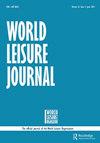洞穴与洞穴:走向对艺术升华的理解
IF 2
Q3 HOSPITALITY, LEISURE, SPORT & TOURISM
引用次数: 0
摘要
本文章由计算机程序翻译,如有差异,请以英文原文为准。
Of caves and caving: towards an understanding of the art of sublimation
ABSTRACT Mobilizing Herbert Marcuse’s argument that modern leisure has been desublimated, which means it represses creativity, imagination and freedom, this article explores the idea that some forms of leisure can be paralogical. This is the suggestion that leisure can be a way of contradicting the legislating rules of consumer culture despite existing within (and therefore being part of) its language game. Using the example of caving, together with Peter Sloterdijk’s celebration of anthropotechnics which is a term he uses to refer to the labour of self-shaping and the practice of self-creation, the article reveals how cavers might disrupt and challenge the normal temporal, spatial and existential orders found in present modernity and caving. Beginning with a discussion that challenges both the old language of caving and figures of control and authority who created it, an attempt is made to reinterpret caves as sites of potential resistance as they are used by some people to find an unstable state known as the differend. The article concludes with the observation that seeking sublimation in the natural underground is in the end all about experiencing feelings of sublimity which occur only after the differend has been located.
求助全文
通过发布文献求助,成功后即可免费获取论文全文。
去求助
来源期刊

World Leisure Journal
HOSPITALITY, LEISURE, SPORT & TOURISM-
CiteScore
3.10
自引率
6.20%
发文量
34
期刊介绍:
As the official journal of the World Leisure Organisation, the purpose of the World Leisure Journal is to stimulate and communicate research, theory, and critical thought in all areas that address leisure, including play, recreation, the arts and culture, sport, festivals, events and celebrations, health and fitness, and travel and tourism. Empirical and theoretical manuscripts, as well as position papers, review articles, and critical essays are published in the World Leisure Journal . The World Leisure Journal is international in scope, and encourages submissions from authors from all areas of the world. Comparative cross-national and cross-cultural research reports are especially welcome. For empirical papers, all types of research methods are appropriate and the subject matter in papers may be addressed from perspectives derived from the social, behavioural, and biological sciences, education, and the humanities. Both pure and applied research reports are appropriate for publication in the World Leisure Journal . In addition to original research reports and review essays, book reviews, research notes, comments, and methodological contributions are appropriate for publication in the World Leisure Journal .
 求助内容:
求助内容: 应助结果提醒方式:
应助结果提醒方式:


